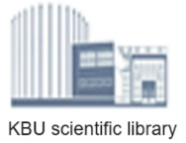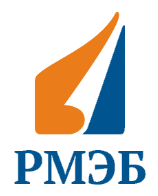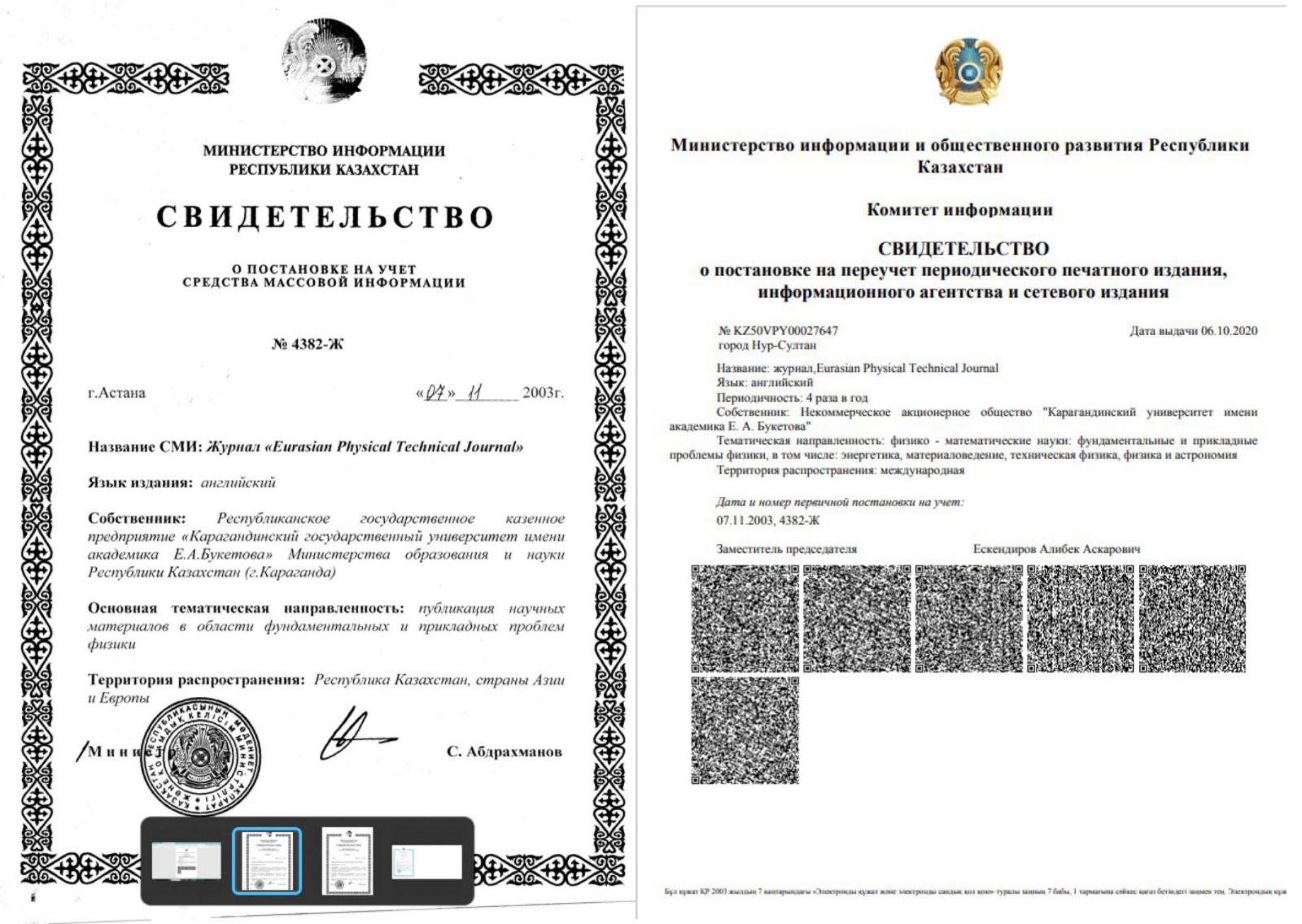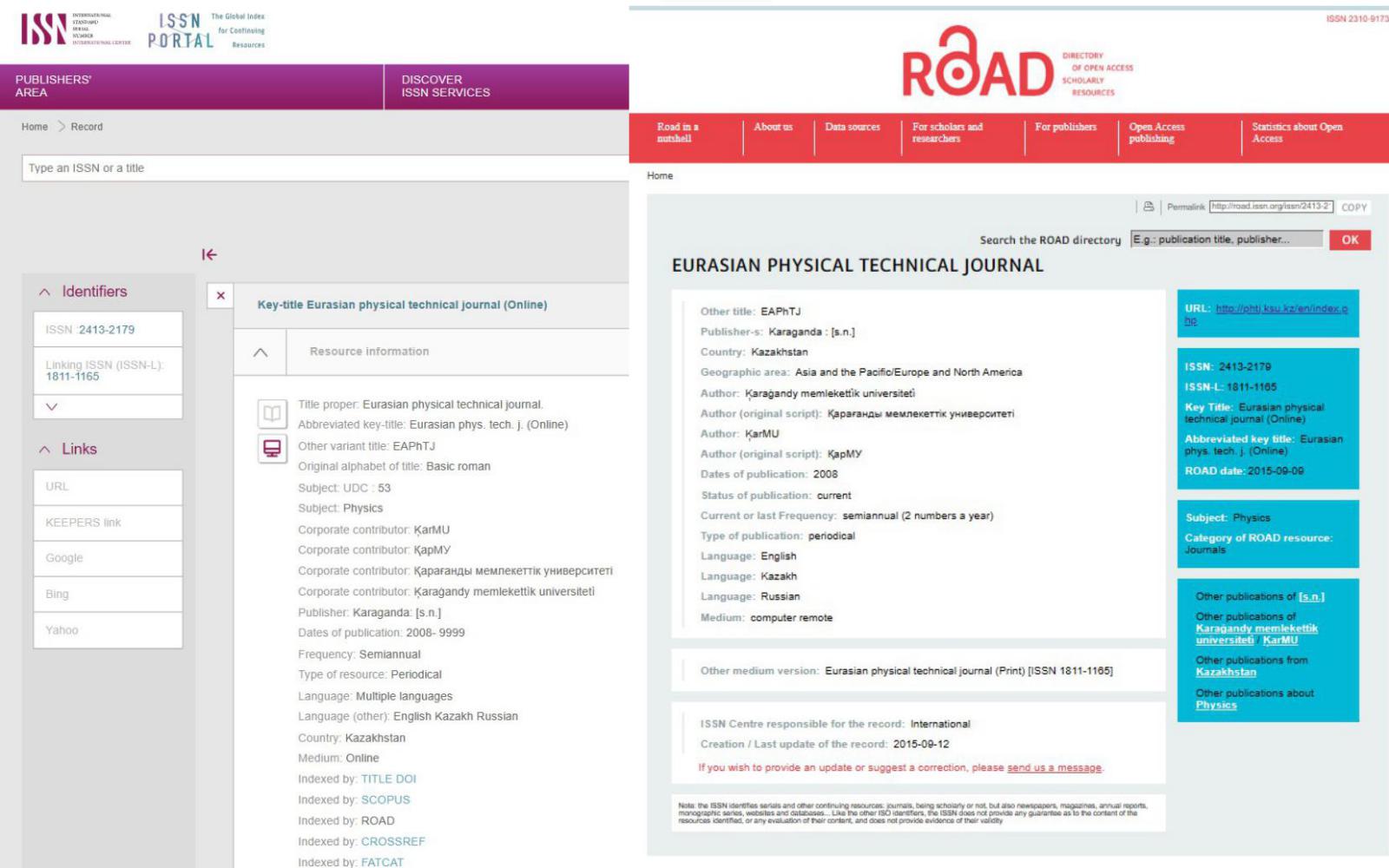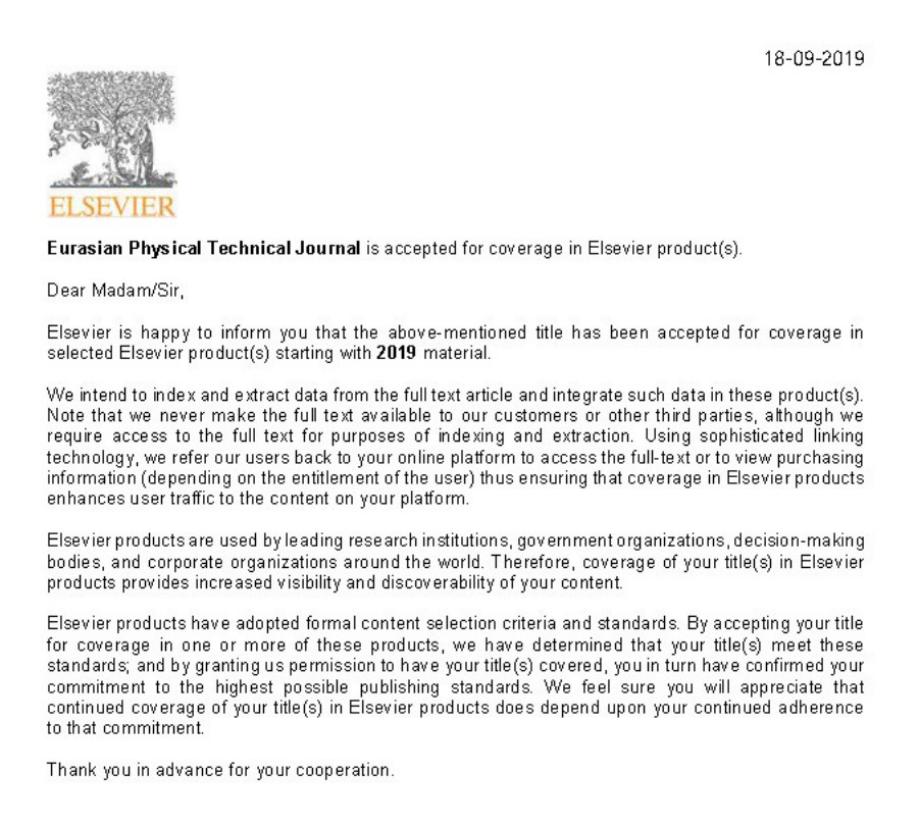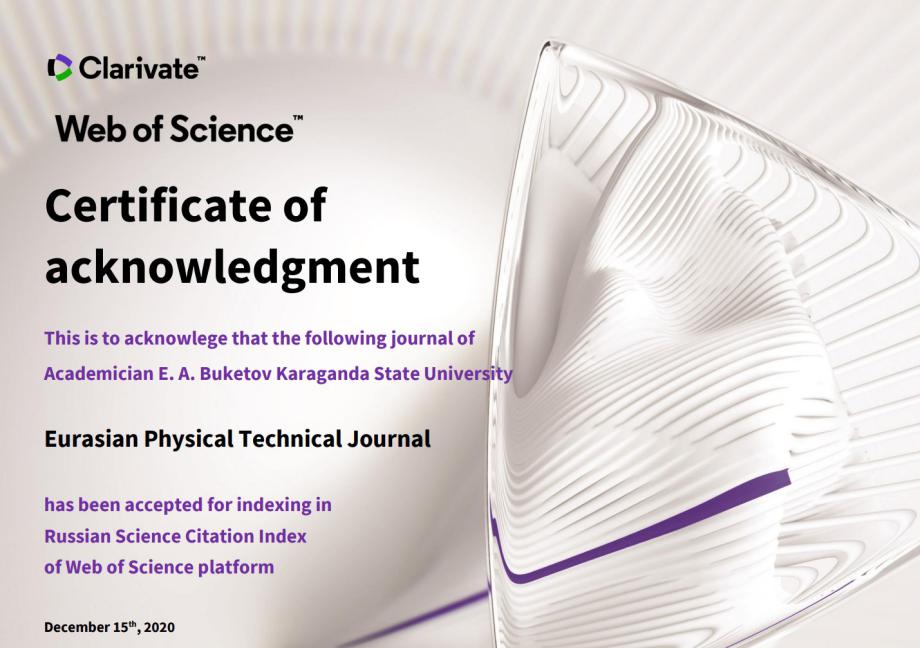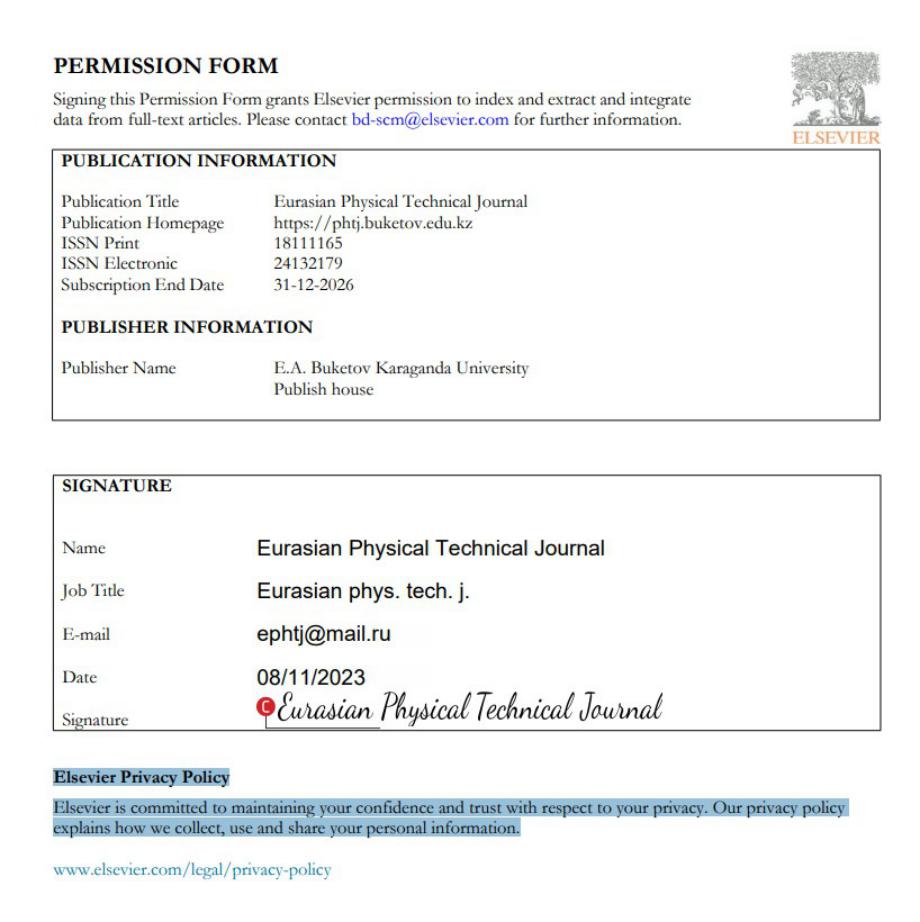Исследование влияния вариации соотношения компонент в двухфазных керамиках на устойчивость к высокодозному облучению протонами, моделирующим эффекты водородного распухания
DOI:
https://doi.org/10.31489/2025N1/5-18Ключевые слова:
водородное распухание, бридеры, двухфазная керамика, высокодозное облучение, литий метацирконат, литий ортоcиликатАннотация
В статье представлены результаты оценки процессов разрушения прочностных и тепловых параметров двухфазной литийсодержащей керамики, подвергшейся высокодозному облучению протонами, воздействие которых моделирует процессы водородного распухания. Интерес к данной теме исследования обусловлен, прежде всего, возможностью определения влияния изменения соотношения двух компонентов метацирконата лития и ортосиликата лития на поддержание стабильности и устойчивости к радиационным повреждениям, а также на диффузионные процессы, связанные с пострадиационным изотермическим отжигом образцов, характерные для моделирования процессов десорбции. В ходе проведенных исследований влияния изменения соотношения компонентов в двухфазной керамике на устойчивость к радиационно-индуцированным процессам размягчения и снижению трещиностойкости было установлено, что, в отличие от однофазной керамики, сочетание двух фаз в составе приводит не только к увеличению начальных прочностных параметров, но и к повышению устойчивости к размягчению за счет наличия межфазных границ. При испытаниях исследуемой керамики на тепловое воздействие (испытания на термостойкость) было выявлено, что в случае двухфазной керамики наблюдается повышение стабильности сохранения прочностных свойств при длительных температурных изменениях.
Библиографические ссылки
Mathew M. D. (2022) Nuclear energy: A pathway towards mitigation of global warming. Progress in Nuclear Energy, 143, 104080. https://doi.org/10.1016/j.pnucene.2021.104080
Bekmuldin M.K., Skakov K., Baklanov V.V., Gradoboyev A.V., Akaev A.S. (2021) Heat-resistant composite coating with a fluidized bed of the under-reactor melts trap of a light-water nuclear reactor. Eurasian Physical Technical Journal, 18(3 (37)), 65-70. https://doi.org/10.31489/2021No3/65-70
Meschini S., Ferry S. E., Delaporte-Mathurin R., Whyte D. G. (2023) Modeling and analysis of the tritium fuel cycle for ARC-and STEP-class DT fusion power plants. Nuclear Fusion, 63(12), 126005. https://doi.org/10.1088/1741-4326/acf3fc
Geng R., Hu J., Zhai Y., Yan J., Wang K., Zhang W., Wang K. (2024) Preparation of Li4SiO4 pebbles with high strength and inhibited lithium volatilization via lithium alginate. Journal of Nuclear Materials, 592, 154973. https://doi.org/10.1016/j.jnucmat.2024.154973
Kenzhina I.E., Kozlovskiy A.L., Chikhray Y., Kulsartov T., Zaurbekova Z., Begentayev M., Askerbekov S. (2023) Study of Gas Swelling Processes under Irradiation with Protons and He2+ Ions in Li4SiO4–Li2TiO3 Ceramics. Crystals, 13(10), 1526. https://doi.org/10.3390/cryst13101526
Kulsartov T., Zaurbekova Z., Knitter R., Kenzhina I., Chikhray Y., Shaimerdenov A., Zholdybayev T. (2024) Comparative analysis of gas release from biphasic lithium ceramics pebble beds of various pebbles sizes and content under neutron irradiation conditions. Nuclear Materials and Energy, 38, 101583. https://doi.org/10.1016/j.nme.2024.101583
Wang Q., Zhou Q., Xiong Q., Zhou J., Li S., Hirata S., Oya Y. (2022) Preparation of Li2TiO3-Li4SiO4-Pb tritium breeding ceramic and its mechanical properties. Ceramics International, 48(18), 26742-26749. https://doi.org/10.1016/j.ceramint.2022.05.369
Chen X., Gong Y., Kang K., Wang Y., Li J., Li Z., Zhang G. (2023) Enhancing properties of Li2TiO3/Li4SiO4 tritium breeding ceramics by chitosan addition. Nuclear Materials and Energy, 37, 101515. https://doi.org/10.1016/j.nme.2023.101515
Chen R., Ipponsugi A., Oyama R., Qi J., Wang H., Huang Z., Katayama K. (2023) Long‐term thermal stability of Li4TiO4–Li2TiO3 core–shell breeding pebbles under continuous heating in H2/Ar atmosphere. International Journal of Applied Ceramic Technology, 20(4), 2576-2585. https://doi.org/10.1111/ijac.14392
Ipponsugi A., Katayama K., Hoshino T. (2023) Tritium release behavior from neutron-irradiated Li₂+ xTiO₃+ y with 20wt% Li₂ZrO₃ pebbles under different atmospheres. Fusion Engineering and Design, 194, 113825. https://doi.org/10.1016/j.fusengdes.2023.113825
Yan J., He N., Chen X., Xiao C., Zhao L.J., Gao T. (2021) Design, synthesis and characterization of advanced tritium breeder: Li4Si1-xTixO4 ceramics. Ceramics International, 47(10), 14178-14182. https://doi.org/10.1016/j.ceramint.2021.02.004
Liu W., Di J., Zhang W., Xue L., Yan Y. (2019) Influence of titanium sources on the microstructures and properties of Li2TiO3 ceramics prepared by hydrothermal method. Fusion Engineering and Design, 138, 364-371. https://doi.org/10.1016/j.fusengdes.2018.12.033
Guo H., Wang H., Chen R., Gong Y., Yang M., Ye D., Lu T. (2021) Characterization of Li-rich Li2TiO3 ceramic pebbles prepared by rolling method sintered in air and vacuum. Journal of Nuclear Materials, 546, 152786. https://doi.org/10.1016/j.jnucmat.2021.152786
Guo H., Wang H., Chen R., Huang Z., Gong Y., Zeng Y., Lu T. (2019) Low-cost fabrication of Li2TiO3 tritium breeding ceramic pebbles via low-temperature solid-state precursor method. Ceramics International, 45(14), 17114-17119. https://doi.org/10.1016/j.ceramint.2019.05.263
Park Y. H., Min K.M., Cho S., Ahn M.Y., Lee Y.M. (2017) Li2TiO3 powder synthesis by solid-state reaction and pebble fabrication for tritium breeding material. Fusion Engineering and Design, 124, 730 -734. https://doi.org/10.1016/j.fusengdes.2017.05.015
Wang H., Qi J., Guo H., Chen R., Yang M., Gong Y., Lu T. (2021) Influence of helium ion radiation on the nano-grained Li2TiO3 ceramic for tritium breeding. Ceramics International, 47(20), 28357-28366. https://doi.org/10.1016/j.ceramint.2021.06.253
Kolb M.H.H., Mukai K., Knitte, R., Hoshino T. (2017) Li4SiO4 based breeder ceramics with Li2TiO3, LiAlO2 and LiXLaYTiO3 additions, part I: Fabrication. Fusion Engineering and Design, 115, 39-48. https://doi.org/10.1016/j.fusengdes.2016.12.033
Shlimas D. I., Borgekov D.B., Kadyrzhanov K.K., Kozlovskiy A.L., Zdorovets M.V. (2024) Study of the Surface-Layer Softening Effects in xLi2ZrO3–(1− x) Li4SiO4 Ceramics under Irradiation with He2+ Ions. Ceramics, 7(2), 547-561. https://doi.org/10.3390/ceramics7020036
Egeland G.W., Valdez J.A., Malo, S.A., McClellan K.J., Sickafus K.E., Bond G.M. (2013) Heavy-ion irradiation defect accumulation in ZrN characterized by TEM, GIXRD, nanoindentation, and helium desorption. Journal of nuclear materials, 435(1-3), 77-87. https://doi.org/10.1016/j.jnucmat.2012.12.025
Shlimas D., Borgekov D.B., Tynyshbayeva K.M., Giniyatova S.G., Moldabayeva G.Z., Kozlovskiy A.L. (2024) Effect of ion-induced dislocation hardening on diffusion and gas swelling mechanisms in carbide ceramics. Eurasian Journal of Physics and Functional Materials, 8(4), 1-147. https://doi.org/10.69912/2616-8537.1233
Rymzhanov R.A., Medvedev N., O'Connell J.H., Skuratov V.A., van Vuuren A. J., Gorbunov S.A., Volkov A. E. (2020) Insights into different stages of formation of swift heavy ion tracks. Nuclear Instruments and Methods in Physics Research Section B: Beam Interactions with Materials and Atoms, 473, 27-42. https://doi.org/10.1016/j.nimb.2020.04.005
Kadyrzhanov K.K., Tinishbaeva K., Uglov V.V. (2020) Investigation of the effect of exposure to heavy Xe22+ ions on the mechanical properties of carbide ceramics. Eurasian Physical Technical Journal, 17(1 (33)), 46-53. https://doi.org/10.31489/2020No1/46-53
Moritani K., Tanaka S., Moriyama H. (2000) Production behavior of irradiation defects in lithium silicates and silica under ion beam irradiation. Journal of nuclear materials, 281(2-3), 106-111. https://doi.org/10.1016/S0022-3115(00)00364-0
Tynyshbayeva K. M., Kozlovskiy A. L., Rakhimov R. V., Uglov V. V., Zdorovets M. V. (2023) Study of The Gas-Swelling Mechanisms in Silicon Carbide Ceramics under High-Temperature Irradiation with Helium Ions. Materials, 16(17), 5750. https://doi.org/10.3390/ma16175750
Ryskulov A.E., Ivanov I.A., Kozlovskiy A.L., Konuhova M. (2024) The effect of residual mechanical stresses and vacancy defects on the diffusion expansion of the damaged layer during irradiation of BeO ceramics. Optical Materials: X, 24, 100375. https://doi.org/10.1016/j.omx.2024.100375
Kenzhina I., Kulsartov T., Knitter R., Chikhray, Y., Kenzhin Y., Zaurbekova Z., Nesterov E. (2022) Analysis of the reactor experiments results on the study of gas evolution from two-phase Li2TiO3-Li4SiO4 lithium ceramics. Nuclear Materials and Energy, 30, 101132. https://doi.org/10.1016/j.nme.2022.101132
Estrin Y., Tóth L.S., Molinari A., Bréchet Y. (1998) A dislocation-based model for all hardening stages in large strain deformation. Acta materialia, 46(15), 5509-5522. https://doi.org/10.1016/S1359-6454(98)00196-7
Xie Q., Li Z., Ma H., Liu S., Liu X., Liu J., Sidor J. J. (2023) Correlation between dislocation hardening and the geometrically-necessary-dislocation densities in a hexagonal-close-packed Zr-2wt% Ti alloy. Materials Science and Engineering: A, 868, 144768. https://doi.org/10.1016/j.msea.2023.144768
Yin Z., Huang C., Zou B., Liu H., Zhu H., Wang J. (2013) Study of the mechanical properties, strengthening and toughening mechanisms of Al2O3/TiC micro-nano-composite ceramic tool material. Materials Science and Engineering: A, 577, 9-15. https://doi.org/10.1016/j.msea.2013.04.033
Syed K., Motley N. B., Bowman W.J. (2022) Heterointerface and grain boundary energies, and their influence on microstructure in multiphase ceramics. Acta Materialia, 227, 117685. https://doi.org/10.1016/j.actamat.2022.117685
Gong Y., Yu X., Yang M., Wei J., Shi Y., Huang Z., Huang W. (2015) A facile approach to fabricate Li4SiO4 ceramic pebbles as tritium breeding materials. Materials Letters, 159, 245 - 248. https://doi.org/10.1016/j.matlet.2015. 06.108
Rao G. J., Mazumder R., Dixit D., Ghoroi C., Bhattacharyya S., Chaudhuri P. (2019) Fabrication and characterization of Li4SiO4 pebbles by extrusion spheroidization technique: Effects of three different binders. Ceramics International, 45(3), 4022-4034. https://doi.org/10.1016/j.ceramint.2018.11.081
Snead L. L., Katoh Y., Connery S. (2007) Swelling of SiC at intermediate and high irradiation temperatures. Journal of Nuclear Materials, 367, 677-684. https://doi.org/10.1016/j.jnucmat.2007.03.097
Snead L.L., Burchell T.D., Katoh Y. (2008) Swelling of nuclear graphite and high-quality carbon fiber composite under very high irradiation temperature. Journal of Nuclear Materials, 381(1-2), 55-61. https://doi.org/10.1016/j.jnucmat.2008.07.033



